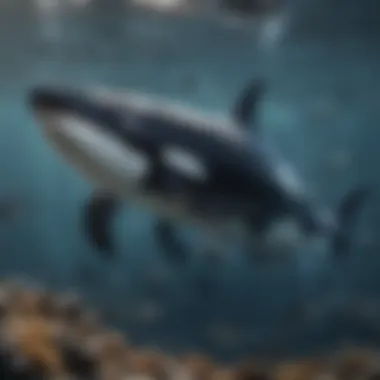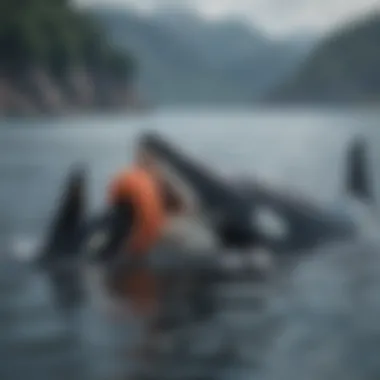Unveiling the Intriguing Diet of Orca Whales: A Marine Exploration


Nature Topic Overview
Orca whales, famously known as killer whales, are magnificent apex predators of the oceans. Their diet is a fascinating subject to explore, shedding light on their diverse food preferences and exceptional hunting techniques. Dive into the depths of this article to unravel the intricacies of orca whales' feeding habits and their significant impact on marine ecosystems.
Fun Facts and Trivia
Delving into the world of orca whales reveals intriguing facts that captivate young readers. Did you know that orcas are not whales but the largest species of dolphin? Their diet includes fish, seals, and sometimes even whales. These apex predators possess immense intelligence, with sophisticated hunting strategies that vary across different orca populations. Visual aids and interactive elements in this article bring these facts to life, enhancing the learning experience for curious minds.
Wildlife Explorations
In the vast realm of marine wildlife, orca whales stand out as apex predators with a diverse diet. Beyond orcas, the oceanic ecosystem is home to various species interconnected through intricate food webs. Exploring this interconnectedness sheds light on the importance of maintaining biodiversity for ecosystem stability. Dive into quizzes and puzzles related to marine wildlife to deepen your understanding of this captivating habitat.
Environmental Awareness
Understanding the vital role orca whales play in marine ecosystems underscores the importance of conservation efforts. Preservation of marine habitats and sustainable practices are crucial in safeguarding the delicate balance of nature. Children can contribute to environmental conservation by learning about marine species and habitats, practicing responsible consumption habits, and engaging in local conservation initiatives.
DIY Nature Activities
Engage young minds with hands-on nature activities inspired by the remarkable diet of orca whales. Create ocean-themed crafts using recycled materials, simulate marine food chains through simple experiments, or embark on outdoor explorations to observe local wildlife. By connecting children with nature through interactive experiences, we foster a sense of wonder and respect for the environment, encouraging future generations to become stewards of the natural world.
Introduction
Understanding Orca Whales
In dissecting the enigmatic nature of orca whales, it is imperative to first grasp the fundamental aspects that define these majestic creatures.
An Overview of Orca Whales


One of the most distinctive features of orca whales is their striking black and white coloration, reminiscent of a monochromatic masterpiece adrift in the ocean. This color pattern, unique to orcas, serves as a visual hallmark that sets them apart from other marine species. Furthermore, the sleek and robust physique of orca whales enhances their agility in navigating the vast marine landscapes, allowing them to traverse long distances in search of sustenance.
Classification and Characteristics
Understanding the taxonomy of orca whales unveils a trove of insights into their genetic lineage and evolutionary adaptations. Classified within the Delphinidae family, orcas belong to the oceanic dolphin grouping, showcasing their close kinship to species like the common dolphin and pilot whale. Their characteristic black dorsal fin soaring proudly above the ocean's surface is a defining trait that aids in species identification, symbolizing strength and resilience in the face of maritime challenges.
Hunting Strategies
The hunting prowess of orca whales is a testament to their strategic acumen in securing prey within the vast expanse of the ocean.
Pack Hunting Techniques
Employing sophisticated pack hunting techniques, orca pods collaborate seamlessly to encircle schools of fish or marine mammals, demonstrating a synchronized approach that maximizes hunting efficiency. This collaborative venture not only ensures a successful hunt but also fosters social bonds within the pod, contributing to the cohesive fabric of orca social dynamics.
Coordinated Attacks
Orchestrating meticulously coordinated attacks, orcas exhibit a level of teamwork that rivals the precision of a well-oiled machine. By strategically coordinating their movements and vocalizations, orcas execute attacks with precision, showcasing a level of intelligence and adaptability that distinguishes them as apex predators of the oceanic realm.
Seasonal Variances
The dietary preferences of orca whales undergo subtle shifts in response to the seasonal rhythms that govern marine ecosystems, offering a glimpse into the adaptive nature of these marine behemoths.
Impact of Seasonal Changes on Diet
Seasonal fluctuations in prey abundance prompt orca whales to adjust their foraging patterns, displaying a keen sense of environmental awareness. During bountiful seasons, orcas may exhibit a more diverse diet to capitalize on plentiful resources, while lean periods necessitate strategic conservation of energy reserves to endure periods of scarcity. This dynamic interplay between orca dietary habits and seasonal variations underscores the symbiotic relationship between these apex predators and the ever-changing marine landscape.
Through a comprehensive exploration of the captivating diet of orca whales, we unravel the complexities of their hunting tactics, dietary dynamics, and ecological significance, offering a nuanced perspective on their pivotal role as guardians of the marine ecosystem.
Orca Whale Diet


Orca whales, known as apex predators, play a vital role in marine ecosystems. Their diet is a complex yet essential aspect of their existence. Understanding the dietary habits of orcas provides valuable insights into their impact on the ecological balance of the oceans. By exploring the variety of food sources these majestic creatures rely on, we can appreciate their significance in maintaining the health of the marine environment.
Variety in Food Choices
Fish Consumption
Fish form a significant part of the orca whale's diet. Their consumption of fish varies based on species availability and migratory patterns. The high protein content in fish contributes to the nutritional needs of orcas, sustaining their energy levels for hunting and survival. Despite occasional challenges in locating specific fish species, orcas exhibit remarkable efficiency in catching and consuming their aquatic prey.
Preying on Marine Mammals
Orca whales are known for their ability to prey on marine mammals such as seals and sea lions. This hunting behavior requires strategic planning and execution, showcasing the intelligence and adaptability of these creatures. By preying on marine mammals, orcas also help regulate marine mammal populations, preventing overpopulation that could disrupt the marine ecosystem's balance.
Interactions with Sharks
Interactions between orca whales and sharks reveal insights into their dynamic relationship within the marine food chain. While orcas may occasionally interact with sharks during feeding activities, these interactions are more nuanced than simple predator-prey dynamics. Understanding the behaviors and interactions between orcas and sharks sheds light on the complexities of marine predator relationships.
Hunting Strategies
Pack Hunting Techniques
One of the most fascinating aspects of orca whale behavior is their pack hunting techniques. By working together in coordinated groups, orcas are able to target larger prey efficiently. This cooperative hunting strategy displays advanced social behavior and communication skills among orcas, allowing them to maximize their hunting success and ensure the survival of their pod.
Coordinated Attacks
Coordinated attacks by orcas involve precise coordination and timing among pod members. This strategic approach to hunting enables orcas to overpower larger marine mammals through teamwork and collaboration. By orchestrating coordinated attacks, orcas demonstrate their ability to adapt their hunting strategies to varying prey types and environmental conditions.
Seasonal Variances
Impact of Seasonal Changes on Diet


Seasonal changes influence the availability of prey for orca whales, affecting their dietary patterns. Adapting to these changes requires flexibility and resourcefulness, as orcas must adjust their hunting strategies based on seasonal variations in prey abundance. Understanding the impact of seasonal changes on the diet of orca whales provides valuable insights into the resilience and adaptability of these apex predators.
Ecological Significance
The ecological significance of orca whales plays a pivotal role in maintaining the balance of marine ecosystems. These apex predators are vital for preserving the health of the oceans by controlling the population of various species in their habitat. Their presence influences the dynamics of the food chain, ensuring a harmonious coexistence among different marine creatures. Understanding the ecological significance of orca whales provides profound insights into the intricate web of life underwater.
Role in Marine Ecosystems
Top Predators in the Food Chain
Orca whales hold the esteemed position of being top predators in the food chain, exerting significant influence on ecosystem dynamics. Their role as apex predators underscores their unrivaled hunting prowess and ability to regulate prey populations effectively. Being at the helm of the marine food pyramid, these majestic mammals showcase unparalleled hunting skills that contribute to the overall ecological balance of the oceans.
Regulation of Prey Populations
The regulation of prey populations by orca whales is a critical aspect of their ecological significance. By preying on specific species, they control the population of various marine creatures, preventing overpopulation that could otherwise disrupt the delicate balance of the ecosystem. This regulatory function helps maintain biodiversity and ensures sustainable resource management within marine environments, showcasing the intricate interplay of predator-prey relationships.
Nutritional Balance
Impact of Orca Whale Diet on Environment
The impact of the orca whale diet on the environment is multifaceted, encompassing both direct and indirect consequences. Their dietary choices influence prey populations, which in turn affect the abundance of different species in marine ecosystems. By maintaining a delicate nutritional balance through selective feeding habits, orca whales contribute to the overall health and stability of the environment. Understanding the intricate interconnections between diet and ecosystem health sheds light on the far-reaching effects of these apex predators on their surroundings.
Conservation Concerns
The Conservation Concerns regarding orca whales play a crucial role in understanding and preserving these magnificent creatures in our marine ecosystems. As apex predators, orcas hold a vital position in the delicate balance of ocean life. By focusing on the specific elements of Conservation Concerns, we can delve into the benefits and considerations essential for the well-being of orca whale populations. The conservation efforts aim to protect these intelligent mammals and maintain the diversity of marine life, ensuring a sustainable environment for future generations. Through highlighting the challenges faced by orcas, we can work towards establishing effective strategies to safeguard their habitat and ensure their survival.
Challenges for Orca Whale Populations
Human-Induced Threats
One of the significant challenges facing orca whale populations is the impact of Human-Induced Threats on their survival. These threats include pollution, vessel traffic, and the decline of prey due to overfishing. The key characteristic of Human-Induced Threats is their anthropogenic origins, directly influenced by human activities. This aspect makes Human-Induced Threats a critical focal point for conservation efforts as addressing human-related impacts is vital to ensuring the well-being of orcas. Despite the challenges posed by Human-Induced Threats, raising awareness and implementing regulations can mitigate their adverse effects on orca whale populations. By understanding the unique features of Human-Induced Threats and their implications, we can work towards sustainable solutions to protect these majestic creatures.
of Habitat Lots
Discussing the of Habitat Lots underscores the grave consequences of habitat loss on orca whale populations. Habitat loss directly impacts the availability of suitable environments for orcas to thrive, leading to disruptions in their feeding and breeding patterns. The main characteristic of of Habitat Lots is their detrimental effect on the ecosystem, causing ripple effects across marine species. Understanding why of Habitat Lots are a critical concern for orcas is essential in emphasizing the urgency to address environmental degradation and habitat destruction. By describing the unique features and implications of of Habitat Lots in the context of orca whale conservation, we can advocate for proactive measures to preserve their natural habitats and ensure long-term species sustainability.







